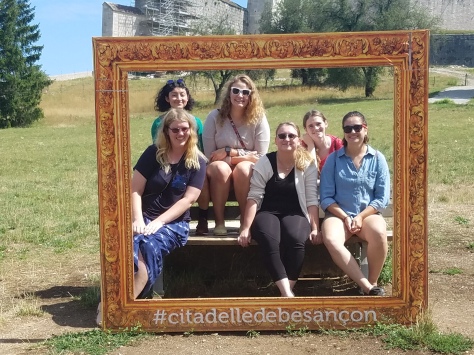
Salvete Omnes,
Although it has been quite some time since I last spoke with you, I am grateful to be allowed the opportunity to do so once more. As some of you may remember, I was a part of the Carthage College 2018 Mandeure excavation as well as the 2017 Omrit excavation- both of which are covered in the archives of this blog. Regardless of my prior experiences, this year has proved to be vastly different. Since I am now a returning member of the Mandeure dig, I have been granted the priviledge of additional responsibilities. Furthermore, the relationships that I established last season with some of the crew have flourished into something both more meaningful and more mature. For that I am inevitably grateful.
Instead of discussing my field work with you– which both Alissa and Andrew have so gratiously done already– I will describe today’s excursion. Nevertheless, I should say that I am eager to continue exploring the pulpitum and the skene as this season progresses.
Today began like most in Mandeure- a persistant alarm intruding one’s dreams and a quick breakfast with the crew before leaving the fieldhouse. Afterwhich, we made our way to Besançon (approximately an hour South of Mandeure). Covered in stone that bleed from the streets onto the shops and homes, the city was reminescent of a fairy tale. Upon entering the city we were first met with a statue of Victor Hugo, who’s birthplace was in the city. We would witness several dedicatory monuments to the famous author throughout the duration of our visit. As the day progressed, we visited several sites and explored a great many others: the museum, the citadel, the triumphal ancient Roman arch, and so on. I feel as though I will forever be astounded at the capabilities of man. From the implimentation of war, to the application of tools, to the invention of technology, and to the creation of art, man has always managed to push boundaries in an attempt to engage with the world around them. Being able to witness these endeavors through their physical remains (i.e. votive offerings, weapons, etc.) enables us to appreciate not only our own history, but also our constant pursuit of advancement. In many ways, archaeology can then be perceived as a psychological science.
Until Next Time,
Brooke Marie Weltch




